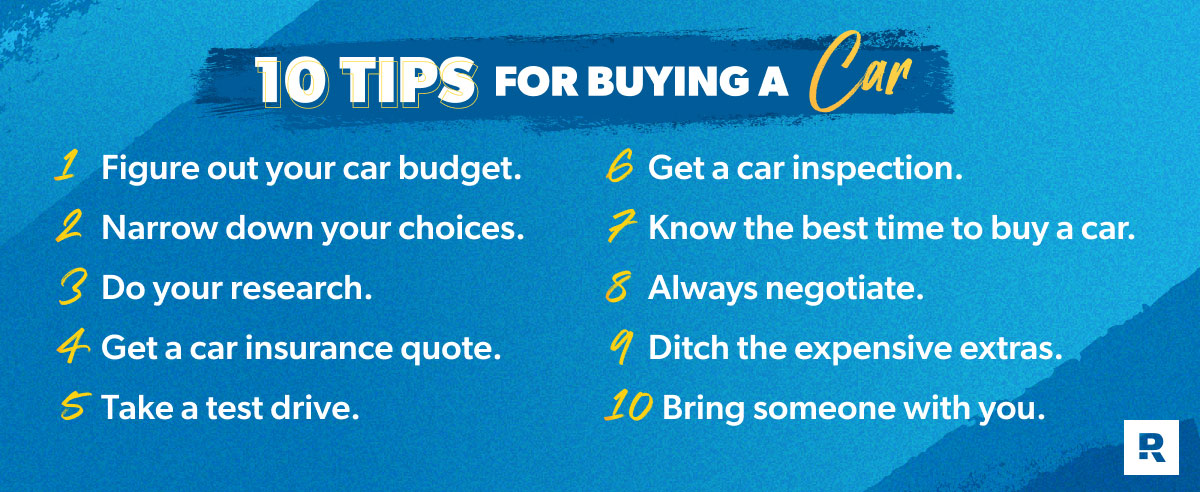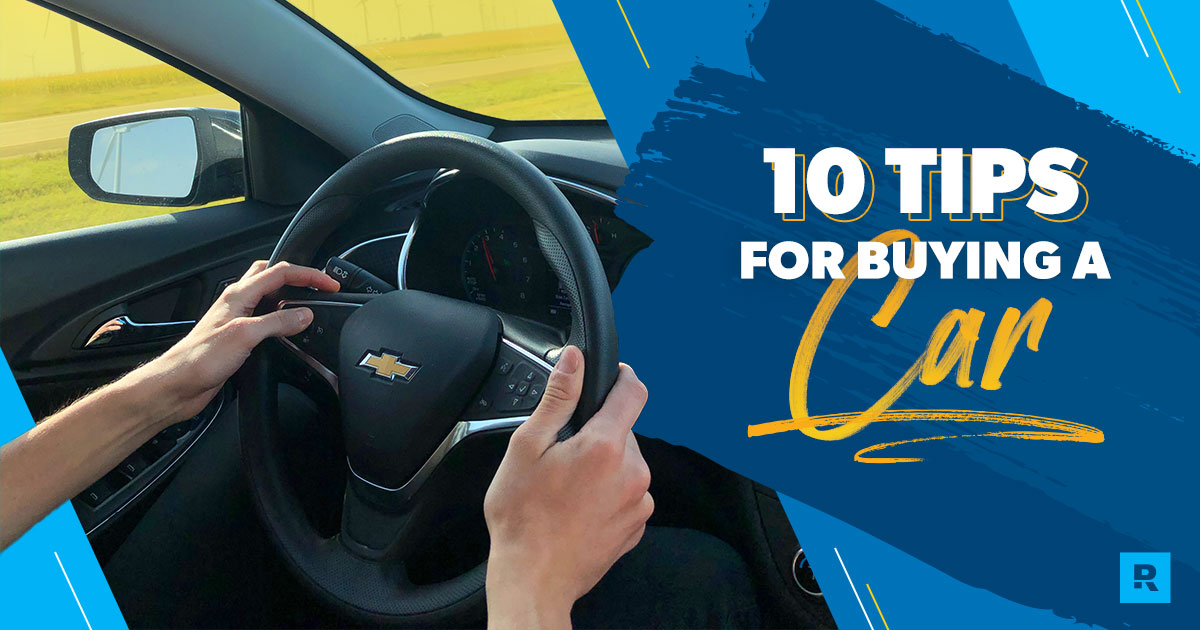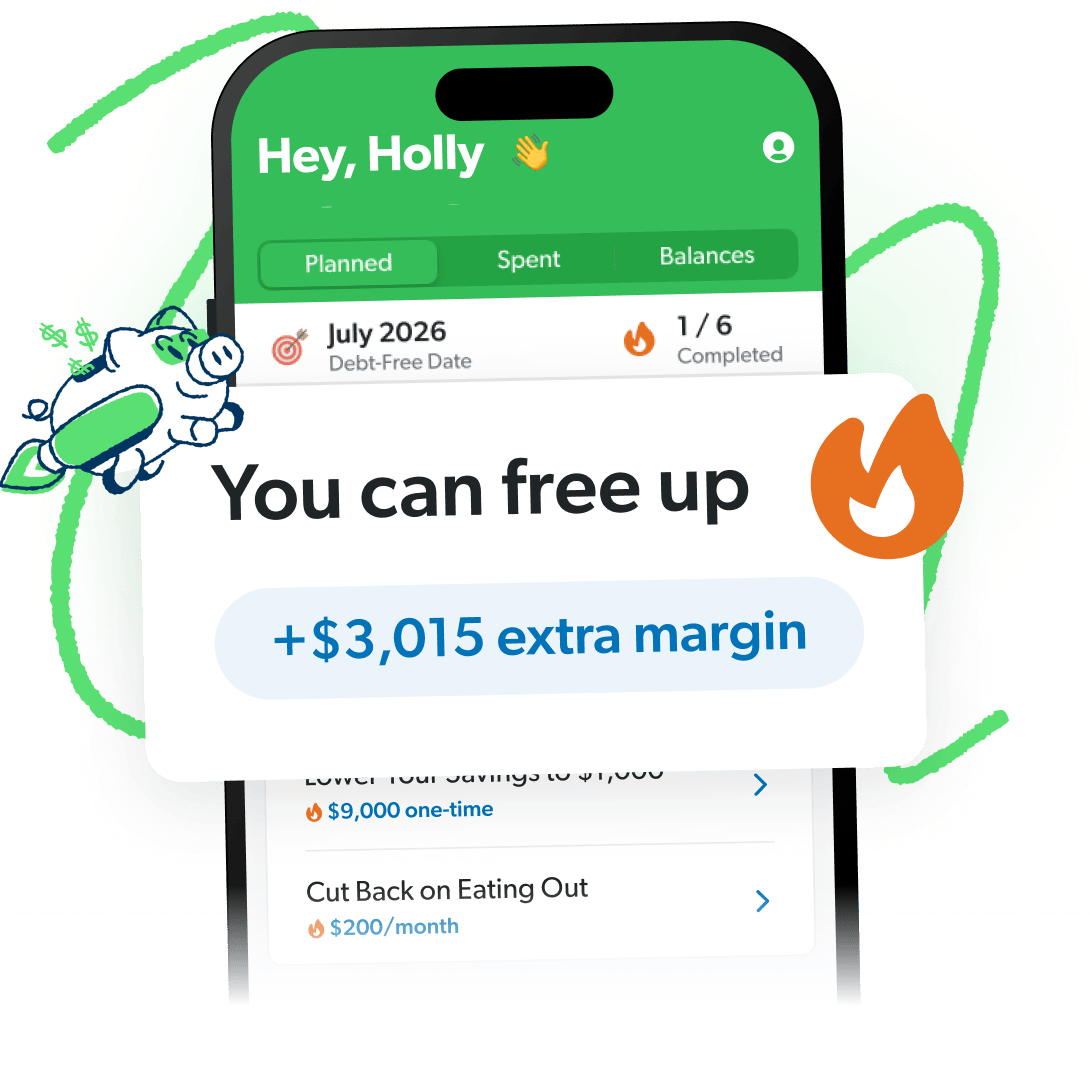Key Takeaways
- Figure out your budget and always pay cash for a car to avoid debt. Buying a used car instead of a new car will save you lots of money.
- Know the car’s value, get it inspected, test drive it, and negotiate based on facts—don't settle for a deal that doesn’t make financial sense.
- Shop at the end of the month or during sales events and skip costly dealer extras that don’t add real value.
Buying a car is a big financial decision that you don’t want to rush into. And the more you know about the process, the more likely you are to get a good deal (instead of ending up with a hunk of junk or completely wrecking your finances).
Get expert money advice to reach your money goals faster!
Use these 10 tips for buying a car to help you find a reliable ride you can actually afford!
10 Car Buying Tips
1. Figure out your car budget.
2. Narrow down your choices.
3. Do your research.
4. Get a car insurance quote.
5. Take a test drive.
6. Get a car inspection.
7. Know the best time to buy a car.
8. Always negotiate.
9. Ditch the expensive extras.
10. Bring someone with you.
1. Figure out your car budget.
Reality check: Brand-new cars drop in value like a bag of rocks, losing 60% of their value in the first five years!1 In other words, you should only consider buying a new car if you have plenty of money to burn. Our rule of thumb: Unless you have a net worth of $1 million or more, choosing a used car over a new one is the smart thing to do.
With that out of the way, you need to decide how much you can actually pay for a car. Going into debt to buy one is a horrible idea, so go ahead and take getting a car loan off the table. Check out our auto loan calculator to see how much a car loan will really cost you. The car you can afford is the car you can pay cash for up-front. Not only is it possible, it’s also the best way to by a car, hands down!
If you don’t have the funds to buy a used car right now, you’ll need to save up. Start by creating a budget. Then, find ways to lower your expenses so you can put money toward a car fund each month. (If you’re buying a car for your teenager, this is a great time to get them involved!)
Remember, leasing or financing a car will not help you build wealth. It’s much easier to save around $533 a month (the average used car payment) for 10 months and buy a used car with no strings attached.2 Do you really want to sign up for years of car payments and pay thousands of extra dollars for several years? Of course, not—you’re smarter than that!
2. Narrow down your choices.
Once you’ve decided on a price, start looking at cars that fit your budget. There are plenty of places to find used cars in your area. Your local dealership likely has a website for you to view the used cars they have in stock. And you can check sites like Craigslist or Facebook Marketplace to see what other cars are on the market.
Then, narrow down your options to a few cars that fit your price range and needs. Consider factors such as safety, speed, gas mileage, comfort, and how it handles in bad weather.
You may love that sporty-looking sedan, but you know in your heart a mini-van is the only thing that makes sense for your family. Remember, just because something is a good fit for your wallet doesn’t mean it’ll work for your lifestyle—so be realistic.
Free Up Margin. Make Real Progress.
The EveryDollar budget app helps you find hidden margin and put it to work so you can stack savings, crush debt, and build wealth that lasts.
3. Do your research.
When you find a few cars you like, you still need to do some more research and ask the right questions before you’re ready to buy a used car. Look up the Kelley Blue Book value of the vehicle to make sure the price is fair for that year and model.
You should also check each vehicle’s history report. This will tell you the accident history, repair information, potential recalls, and other important information about the car. Simply request the Vehicle Identification Number (VIN) from the seller and use a website like VehicleHistory.com or Carfax.com to research the car’s history.
Some sites charge for the car information they provide. But while paid reports may be more comprehensive, free reports will alert you to any major red flags. Some car dealerships or private sellers will also provide a report if you ask. Either way, it’s worth a check—because if you get a good deal but end up in the shop every week for maintenance, you’ll spend more money in the long run.
Here's A Tip
If you're thinking of buying an electric car, hybrid, or plug-in hybrid, find out whether the model you're considering qualifies for the EV tax credit or any other state tax incentives for EVs.
4. Get a car insurance quote.
By this point, you should have a handful of potential cars that check out history-wise and fit within your budget. But one thing people forget to consider is the cost of car insurance. And if you didn’t know, the kind of car you drive affects your monthly premium.
Talk to your current insurance agent about running a few quotes for the cars you have in mind. If the price is too steep, don’t be afraid to consult an independent insurance agent who can shop around to get you the best rate.
Get the car insurance you actually need.
With a RamseyTrusted pro in your corner, you’ll get the top-notch insurance coverage you need without breaking the bank.
5. Take a test drive.
Now for the fun part: Take the car for a test drive!
You should know exactly what you want before you even step foot in a dealership. Otherwise, car salesmen are quick to steer you in the more expensive direction. So, keep an eye out for their upselling tactics! If the dealership doesn't have the car you want but they have a similar budget-breaking model with a new sound system and heated seats, it's still not the right car for you.
Once you're ready to get behind the wheel for your test drive, choose a route that allows you to experience different types of driving. The way a car handles on the highway will be different than how it drives in the city. Pay attention to anything that seems odd. Does the car rattle when you go over a bump? Are there any weird noises?
Write down whatever you notice so you know what problems to bring to the table when negotiating (more on that in a minute).
6. Get a car inspection.
Before you commit to a used car, you need to take it to a mechanic for a full inspection. While the car might look and feel fine when you take it around the block, you never know what could be going on under the hood. And sellers can lie about the true condition of a car when there’s money on the line.
Don’t feel awkward about asking for an inspection. This is a routine part of the car-buying process. And if the seller is hesitant or gets upset when you ask for one, that’s a huge red flag they probably have something to hide.
7. Know the best time to buy a car.
Generally, the best times to buy a car are during holiday weekend sales, at the end of the month and at the end of each quarter—when salespeople are trying to make their quotas. So, try to buy around March, June, September or December.
During the late summer, a lot of dealerships want to sell as many cars as possible to clear space for newer vehicles. And around the end of the year, they start slashing prices so they can hit their yearly goals. You can also try going later in the day to see if dealers are more willing to make a sale before their shift ends.
With how crazy the used car market is right now, you may not get as good of a deal as you could’ve before with this tip. But waiting for the right time to buy a car can still save you hundreds—if not thousands—of dollars on the final sales price.
8. Always negotiate.
If you’ve done your research and you’re paying with cash, you’ve already got a leg up on negotiating the best car price. And listen, it doesn’t have to be as scary as it sounds.
Give the seller a price you're willing to pay for the car. This price should be lower than what you're actually willing to pay so there's room for you and the seller to meet in the middle. And be sure to mention any problems that came up during the test drive or inspection.
Negotiation is all about the attitude. You have to be willing to walk away from this car if the seller doesn’t come down on the price. If a dealer senses for even a second that you really want a certain car, you won’t get a good deal.
It also helps to see if another third party or dealership is selling the same car for a better price. If you get a deal from one seller and take that dollar amount to another seller, they may come down on the cost. Just be super clear that you’re paying in cash and you’re not interested in having a car payment. While dealerships will probably still push you to finance, they ultimately want to make the sale—so don’t back down.
9. Ditch the expensive extras.
When buying a car, don’t get trapped into paying for things you don’t need—like a roof rack, chrome rims or a fancy back seat sound system. These dealer-added extras can increase the price of the car by hundreds of dollars! So, when they try to talk you into all the ways you can customize your car, just say no.
Also, hold off on purchasing an extended warranty. That money goes straight into the dealer’s pockets, and your odds of actually using that warranty are low (otherwise, dealerships wouldn’t push them so hard).
The truth is, you don’t need an extended warranty if you have your full emergency fund in place. That alone will cover any car repair costs that come up or even cover replacing your car down the line.
10. Bring someone with you.
When you’re buying a car, it’s never a bad idea to take a friend or family member with you—especially if you don’t have much experience with the process or don’t know how to haggle for a good deal.
Another person can help you stick to your budget and spot things about the car you may have missed. And if they know a lot about cars, they can use their knowledge to help you make the best decision.

Our Best Car Tip: Budget for the Car You Want
Remember, the purpose of a vehicle is to get you from point A to point B, not to prove your social status to the world. As tempting as it is to hit the road in a car you can’t afford, it’s more likely to be a burden than a blessing—especially when you’ve got a huge monthly car payment to worry about.
So, do yourself a favor and save up to pay for a car in cash. And the best way to do that is with a budget. A budget helps you make a plan for your money, so you can spend less and save more for the things you want—like a sweet, new-to-you ride!
Ramsey’s EveryDollar budget app helps you find that hidden money fast and gives you step-by-step guidance to use it with purpose. Whether you want to knock out debt, stack up savings, or fund some fun, start EveryDollar for free and make it happen.





